Deeply Rooted
Luther’s mission statement calls us to “practice joyful stewardship of the resources that surround us.” The alumni we profile here, all of whom work toward healthier, more sustainable food systems, take that charge seriously. But, in typical liberal arts fashion, they come at it from very different angles.
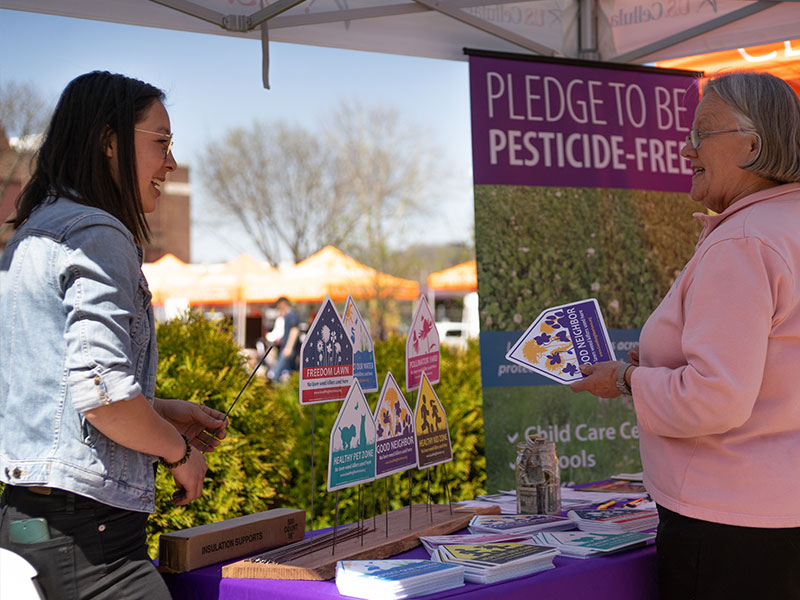
Audrey Tran Lam ’13 (left), pictured here at EcoFest 2019 in Cedar Rapids, Iowa, brings a public health perspective to agricultural practices.
The Educator
Audrey Tran Lam ’13 works at the intersection of agriculture and public health. As environmental health program manager at the University of Northern Iowa’s Center for Environmental Education (CEEE), she oversees its Farming for Public Health program.
She explains, “The program is really about elevating the evidence-based, land-based solutions that work upstream to address this cascade of environmental health problems that ultimately impact people who live in the Midwest and, in particular, Iowa.”
In her role, Audrey educates people on things like PFAs, pesticides, and water quality; the herbicide treadmill and what it means for weed resistance; soil health and flooding; and how all of these things impact human health.
“I find myself being a cross-pollinator in a lot of the settings that I’m in,” she says, “and I make sure to bring perspectives of both public health and agriculture. Whether it’s a public health conference or an agricultural conference, I want to be able to represent the side of the coin that’s not being voiced there.”
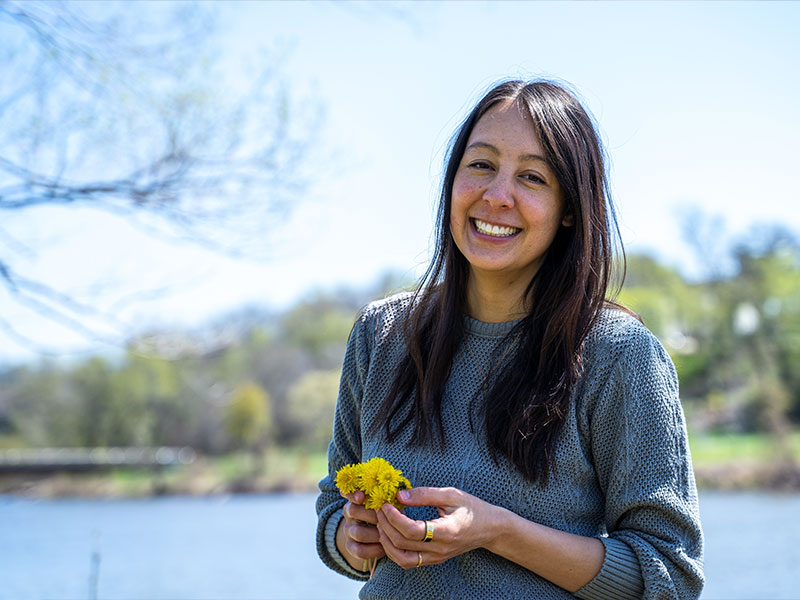
Audrey Tran Lam '13
In terms of solutions, Audrey says, “The simplest thing we could do in order to make incredible strides for public health in the state is to add a third crop to our current corn-soy rotation. By adding in a small grain, we can see significant—like upward of 80 percent significant—decreases in the amount of synthetic nitrogen that’s being applied to these fields, which is one of the main drivers of harmful algal blooms in waterways, in recreational bodies of water and beaches, and in private wells. And this is without impacting profitability.”
She continues, “When soil is improved, we see all of these different metrics emerge around the ecological environment of those fields. You have more microbiotic life in the soil, which improves yields, which improves how what is planted is able to compete with the weeds. It’s very beautiful how the system can come together and work if we’re not fighting against what the soil wants and needs.”
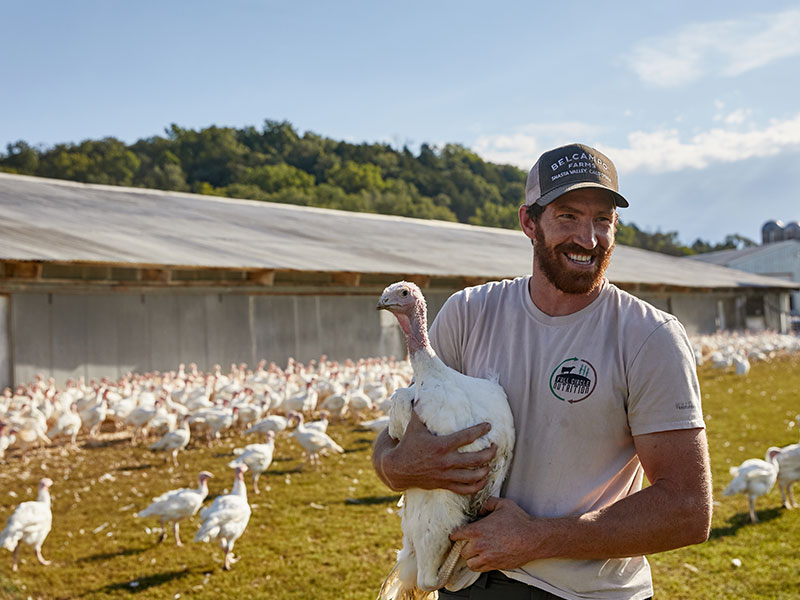
Robby Jewell ’14 and his family raise organic turkeys and experiment with more sustainable ways of tending crops and animals on their 1,600-acre farm.
The Farmers
Robert (Robby) Jewell III ’14 is the sixth generation to farm the nearly 1,600-acre Jewell family farm in Decorah. With his family’s deep farming history, he’s quick to recognize that many farmers feel like they can’t pursue both economic and environmental health—they have to choose one or the other. But through experimenting, innovating, and openness to new ways of doing things, he thinks they’ve found a happy medium.
The Jewells raise organic turkeys, as well as row crops, mostly pastured cattle, and pastured pigs that help manage their scrubland. They tried running their cattle operation organically for about a decade but stopped because they were barely breaking even financially. They grow conventional crops using herbicides and synthetic fertilizers, but they also plant cover crops and farm without tilling (soil tillage increases erosion, nutrient runoff into waterways, and the release of greenhouse gasses).
This flexible approach—experimenting, then adopting methods that work for them and setting aside those that don’t—allows the Jewells to continually move toward ecological health.
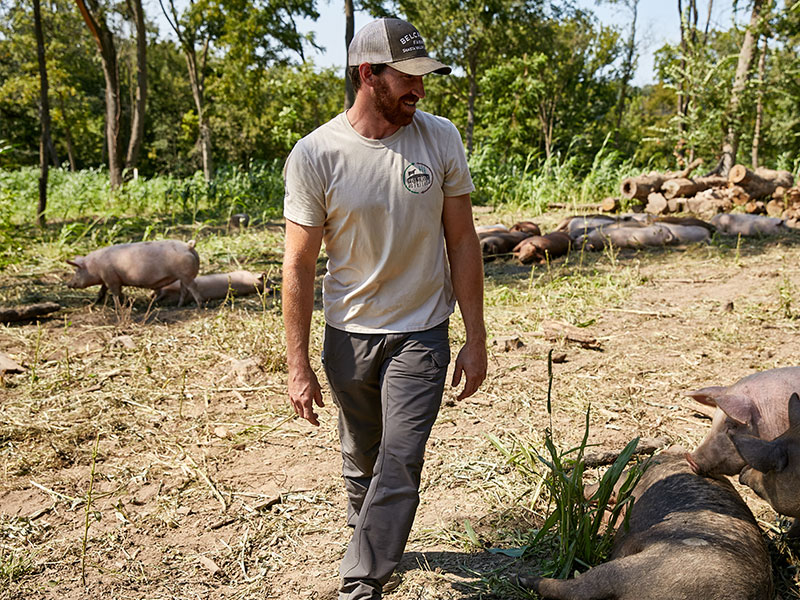
Robby Jewell and his family raise crops and animals, including pigs, on their family farm.
Rotational grazing—moving pastured animals from area to area—is another way in which the Jewells innovate. It prevents overgrazing, but it takes finesse. “It’s been a learning experience for us,” Robby says. “There’s no equation we can look at—it’s different every time. It’s been fun and frustrating. But the land is resilient—when it rests and recovers is when it’s building back deeper, stronger root structures.”
Kevin Oppermann ’06 pivoted to farming from a career in healthcare software at Epic Systems in Verona, Wis. Farming started as a hobby—a way to connect to the farming he’d helped his grandparents with as a kid—but it grew almost overnight into a full-time job when he had the opportunity to buy 150 Scottish Highland cattle. “We moved 100 animals in 24 hours. That was a crazy time,” he recalls.
Everything Kevin does at Highland Spring Farm in Dane County, Wis., is pasture-based. Over the past eight years, he’s converted not only his own property to 100 percent permanent pasture but also most of the Stoneman Family Farm up the road as well. All told, it’s about 150 acres he’s moved out of rotatable crops and tillage and into pasture.
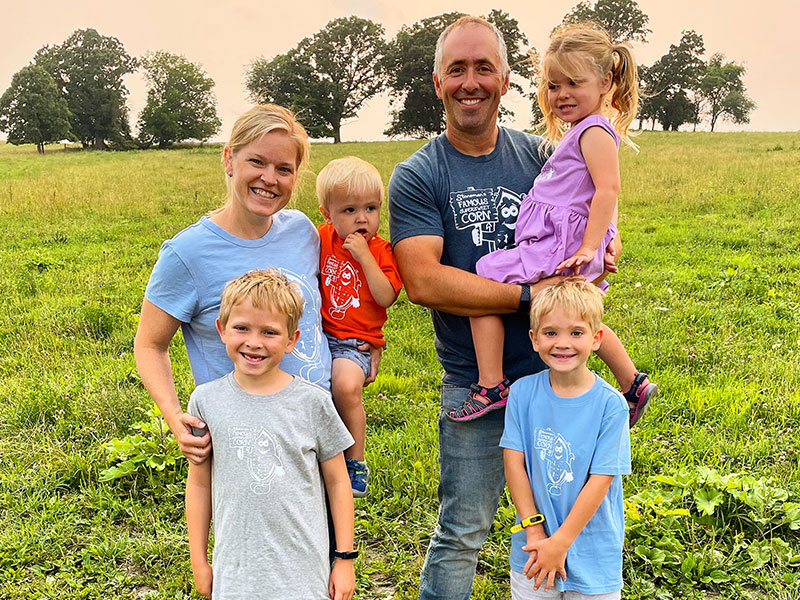
Kevin Oppermann ’06 and his family raise pasture-fed Scottish Highland cattle on their Dane County, Wis., farm.
For Kevin’s family, this way of farming makes economic sense. “It’s a way to differentiate ourselves in the marketplace,” Kevin says. “And one thing I learned in my Luther marketing class is that you don’t have to compete on price to compete on quality. That’s 100 percent what we do now.”
Pasture-raised cattle have turned out to be lower-maintenance for him too. “The sun and rain grow grass for us every year. The cows fertilize,” Kevin says. “All I have to do is run a fence every day. It’s simple compared to having to plant, fertilize, harvest, and truck grain.”
Kevin recognizes the noneconomic benefits of his farm as well: “It’s a great way to go to work every morning, to walk out to the cows, who are belly deep in green grass, happy. One of my favorite things is evening pasture check with the kids, listening to nature, listening to animals chewing grass and cud. Everything feels right about it.”
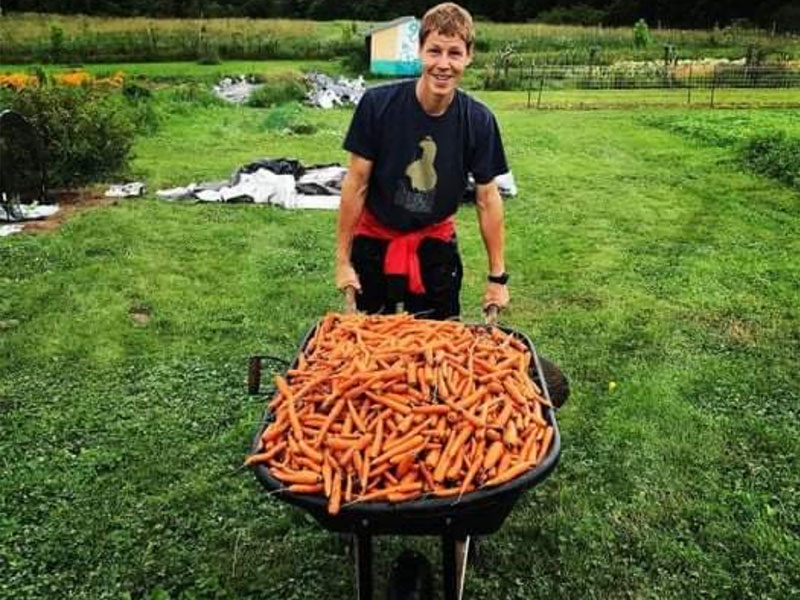
Peter Kraus ’12
The Connector
Sometimes a special something just makes a system work better. In the Decorah regional food scene,
Peter Kraus ’12 of the Iowa Food Hub is that special something.
The nonprofit Iowa Food Hub started around 2012 as a way to connect local food producers with bigger institutional customers like schools and colleges. The hub aggregates food from suppliers within a 150-mile radius of Decorah. It then distributes orders via refrigerated truck to schools, colleges, restaurants, and grocery stores. And, since the start of the pandemic, individual customers can also access local food through its online marketplace.
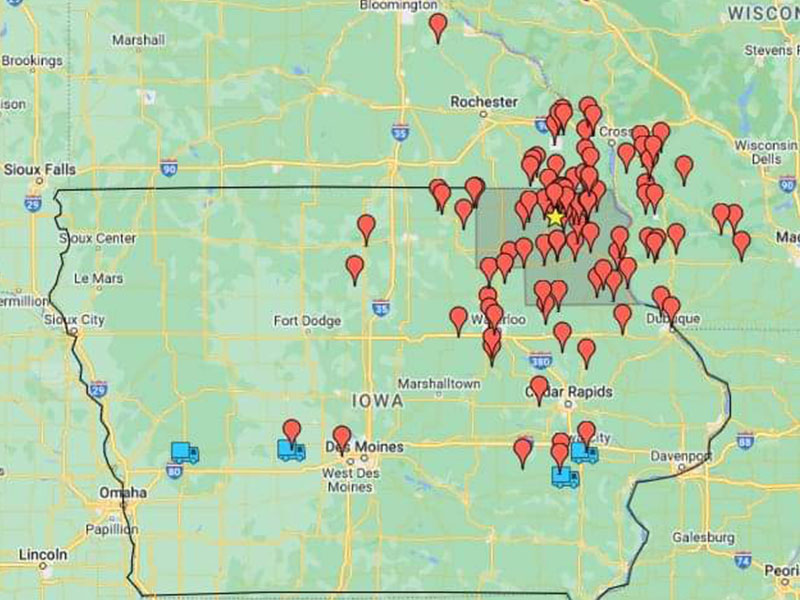
The operation radius of Decorah's Iowa Food Hub
Peter jumped into the position of general manager in August 2020. “It’s been a rollercoaster ever since,” he says. Over the past three years, the food hub has tackled several grant projects to expand delivery routes, grow its staff, add physical infrastructure, and distribute literal tons and tons of locally produced food.
Peter has both farming and culinary experience and thinks that being able to anticipate the needs of producers and chefs is critical to his position. “I like to say that I’m the matchmaker between producer and customer,” he says.
In playing matchmaker, Peter is often elevating the responsible practices of his suppliers. “A lot of our local producers go above and beyond when it comes to stewarding the soil, water, and biodiversity,” he says. “Many are also trying to pay their employees well and, if possible, themselves!”
He feels lucky to play a part in this supply chain, saying, “It’s my job to pass along to customers a deeper sense of place and connection to where their food comes from and how it was produced, from the field to their plate.”
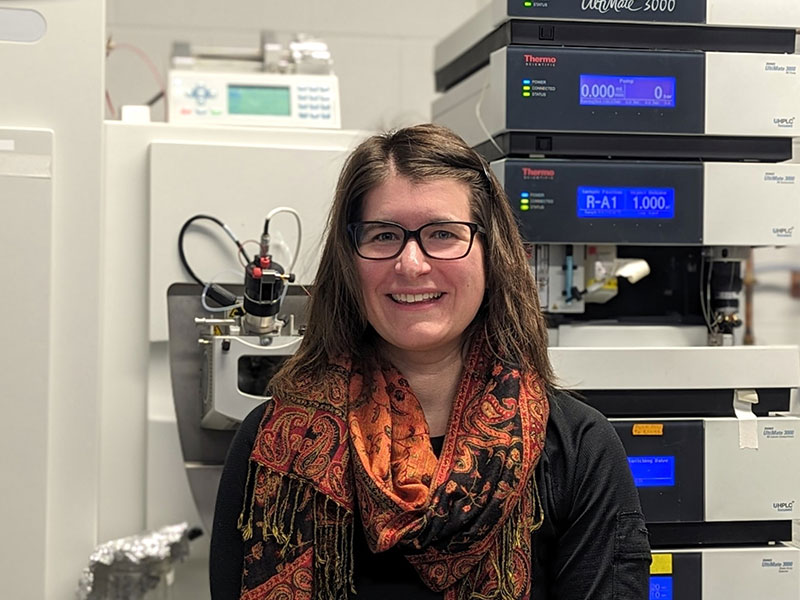
Kate Freund Saxhaug ’11 studies the chemicals plants produce in response to their environments. Research like hers may lead to plant breeds with better pest resistance, requiring less pesticide use.
The Researcher
Kate Freund Saxhaug ’11 is using a new science to make strides in understanding plants. As a postdoctoral researcher at the University of Minnesota, she studies plant metabolomics, the measurement and analysis of metabolites—the products of metabolic reactions—within a system, like a cell or organism.
Kate’s current research examines the chemicals plants produce that help them adapt to their environment. One goal is to reduce the use of synthetic sprays by developing a botanically based deterrent for Japanese beetles. Another goal is to inform breeding efforts. “We want to provide information to breeding programs about which grapevine or apple tree to use to breed in beetle resistance. Can we breed a plant to survive the beetle rather than using pesticides?”
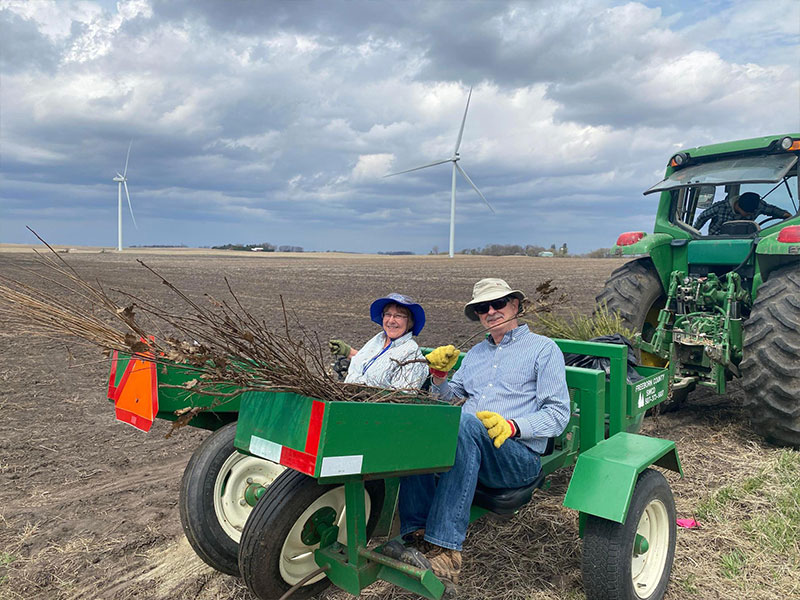
Glenn ’70 and Meg (Funfar) Nielsen ’69 have planted more than 1,000 trees on their farm property.
The Landowners
When Meg (Funfar) Nielsen ’69 of McFarland, Wis., inherited 115 acres of farmland in Minnesota, she and her husband, Glenn ’70, took their new land stewardship seriously. “Since Glenn is a retired instrumental music teacher and I’m still a rostered deacon, neither of us had much experience in farming beyond backyard gardening,” she says. “But once we realized the importance of our idea, there was no turning back.”
After lots of research and support from grassroots organizations, they took 50 acres of corn and soy fields that had been rented out and converted them to pasture grazing. They enrolled another two acres in the Conservation Reserve Program, which gives farmers a yearly payment in exchange for taking land out of production and planting species that will protect soil and water health and build wildlife habitat. And in the past few years, knowing that trees are one of the best ways to prevent soil erosion, they’ve planted more than 1,000 of them!
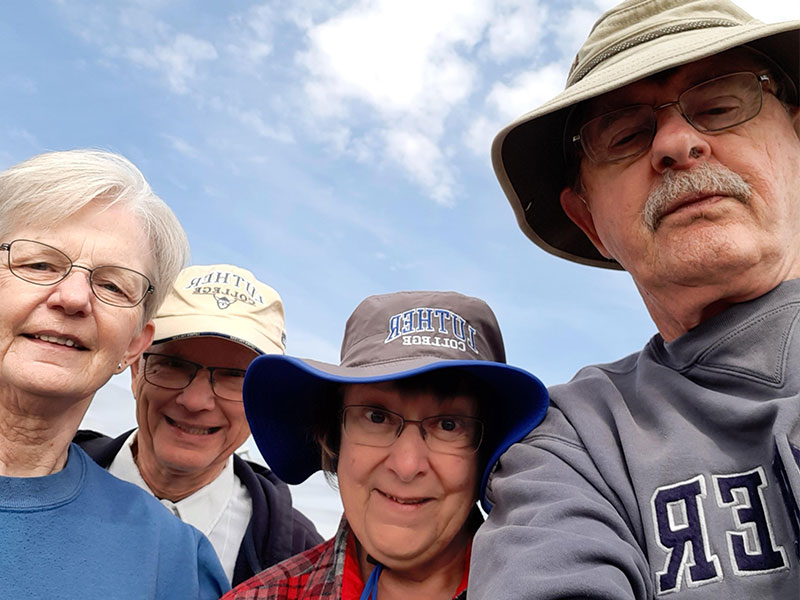
Meg (center right) and Glenn Nielsen (right) had help planting trees from help from their daughter, Jen (Nielsen) Snow ‘96; Jim ‘69 (center left) and Kathy (Olson) Potter ‘70 (left); Ben McDonald Coltvet ‘96 and his son, Abenet; and Emily Aldrich, a St. Paul resident who heard Meg interviewed about the project on MPR and wanted to help!
Meg and Glenn found tremendous support from the people who banded together to form Climate Land Leaders (CLL), a group that the Nielsens and others founded in 2020. Since then, CLL has grown to over 110 members, representing 32,500 acres of land, in just three years. Meg is president of its board of directors.
Meg encourages anyone considering a similar undertaking to reach out to others: “There are thousands of small and large groups that are working to restore the land, alleviate climate change, and care for God’s good creation.”
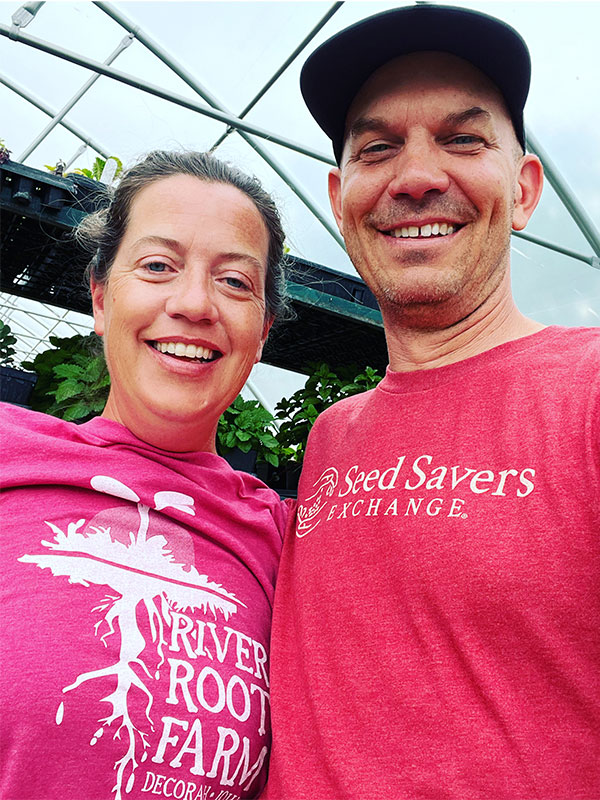
Katie Prochaska ’01 and Mike Bollinger ’02 own River Root Farm in Decorah, where Mike also works as executive director of Seed Savers Exchange.
The Seedkeeper
Healthy food systems depend on shared resources. Mike Bollinger ’02 and Katie Prochaska ’01 know this well.
After college, Katie served with the Peace Corps in Mali, where Mike joined her for an extended time. Katie was focused on agriculture, natural resources, and human health. Mike recalls: “Malnutrition was pervasive simply because of the limited diversity of things to consume. Corn, sorghum, and millet were staples. There was a commodity crop—cotton—that was an export. And there was limited subsistence farming due to the extreme heat and seasonal rainfall. It was a fragile ecosystem of food access.”
The flipside of this was the community care that emerged. When someone ran out of food, neighbors would make sure everyone had something to eat. “It was an initial glimpse for me of what community health could look like,” he says.
Mike and Katie carried the idea of community health with them, eventually, back to Decorah—but they had many stops along the way. They spent their 20s and 30s garnering experiences—from stewarding a regenerative farm, to working as lead horticulturist at the Chicago Botanic Garden (Katie) and urban farming with kids through the Green Youth Initiative (Mike), to consulting with would-be farmers on setting up their infrastructure. Eventually they cofounded a small-farm tool and greenhouse company called Four Season Tools.
In 2009, they bought a seven-acre hillside in Decorah to start a small homestead. Several years later they stepped away from their other ventures and focused on River Root Farm, an organic vegetable farm that includes salad greens, herbs, and flowers. These days, it’s a full-time enterprise for Katie, while Mike focuses on his role, since 2022, as executive director of Seed Savers Exchange (SSE).
SSE collects, preserves, and shares an astounding 20,000 varieties of heirloom seeds. Its website notes that over the last century, the world has lost 75 percent of its edible plant varieties and that seed diversity protects our food system by increasing the probability of having plants that can adapt to a changing climate and the challenges that brings.
SSE engenders a kind of community care that extends across the country. It is, Mike says, “building a community of backyard home gardeners that are preserving a huge array of food and genetic diversity.” It’s maintaining a supply chain that exists outside of the major seed manufacturers, which often breed for uniformity and shipability. And because heirloom seeds are open-pollinated, they’ll grow true to expectation from year to year.
All of this is a major win for food security and edible plant diversity. Ultimately, Mike says, “We’re trying to help people understand that there are things they can do in their own backyards that really matter.”
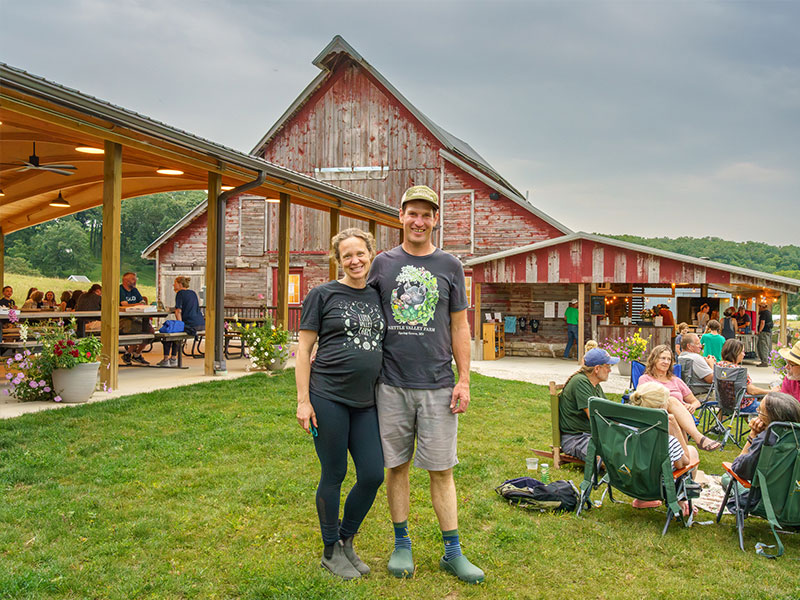
Maren (Stumme-Diers) Beard ’08 and her husband, Tom, own Luna Valley Farm in Decorah. It’s a place of connection and community—especially on pizza nights, during which they serve up many local ingredients. Photo by Charlie Langton.
The Community-Builder
Maren (Stumme-Diers) Beard ’08 has deep roots in the Decorah food system. As a college student learning about the environmental impacts of what we eat, it disappointed her to participate in a board plan that relied on food trucked in from far and wide.
As a student, and later as a Luther staff member, she worked to change the system from the inside. She helped Luther Dining Services source about 35 percent of Luther’s food from local suppliers. She notes, “It was a lot more work for them to develop those relationships with local farmers and actually peel vegetables and prepare things fresh, but they did.” (Luther’s current purchases vary seasonally, with between 19 and 38 percent of food purchased from local vendors.)
In 2014, Maren and husband Tom started Luna Valley Farm in Decorah, where they keep pasture-raised beef and lamb. In 2017, they began their popular pizza nights, serving artisan pizza pies using local ingredients, including some from their own farm. In a full-circle kind of way, the Beards give back to their community through donating a percentage of pizza sales to local organizations like the Decorah Community Food Pantry and Practical Farmers of Iowa.
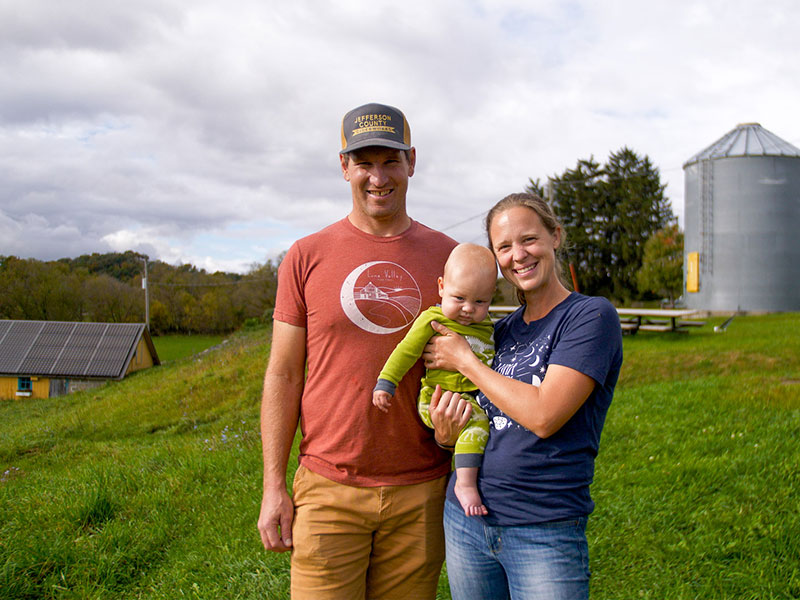
Tom and Maren (Stumme-Diers) Beard ’08 with their son, Fritz (a second son, Otto, has since joined the family)
Luna Valley has earned well-deserved coverage in national publications from Better Homes and Gardens to the New York Times (in an article that also featured the family farm of Zach Hawkins ’04!). It’s an inviting and magical place.
“It’s always been a goal of ours to make Luna Valley a place where everybody feels welcome,”
Maren says. “We have neighbors from many different backgrounds who love coming for our pizza. It’s a place of connection.”
By inviting people to experience that connection and participate in local food sourced from small farms, Maren and the folks at Luna Valley are ultimately helping to shape their community. “How we eat has a really significant impact on landscapes—literal and economic,” she says. “If there aren’t small farms with small herds of livestock, there aren’t going to be veterinarian offices to serve them. There aren’t going to be small feed stores. When a small town like Decorah has farms of all sorts that can support different businesses, it really makes it a thriving community.”